Unit 2 We’ re Family Section A(1a-2e)课件+音视频(共66张PPT)人教版(2024)七年级上册
文档属性
| 名称 | Unit 2 We’ re Family Section A(1a-2e)课件+音视频(共66张PPT)人教版(2024)七年级上册 | 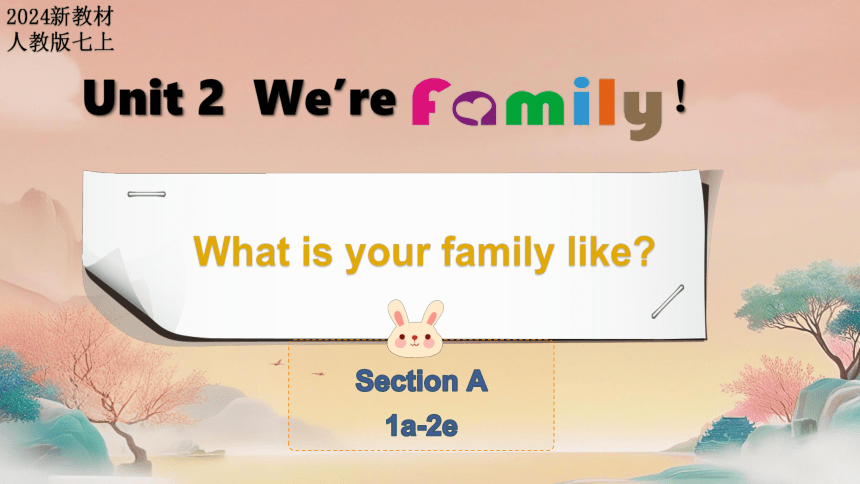 | |
| 格式 | pptx | ||
| 文件大小 | 81.4MB | ||
| 资源类型 | 教案 | ||
| 版本资源 | 人教版 | ||
| 科目 | 英语 | ||
| 更新时间 | 2025-07-13 19:35:47 | ||
图片预览

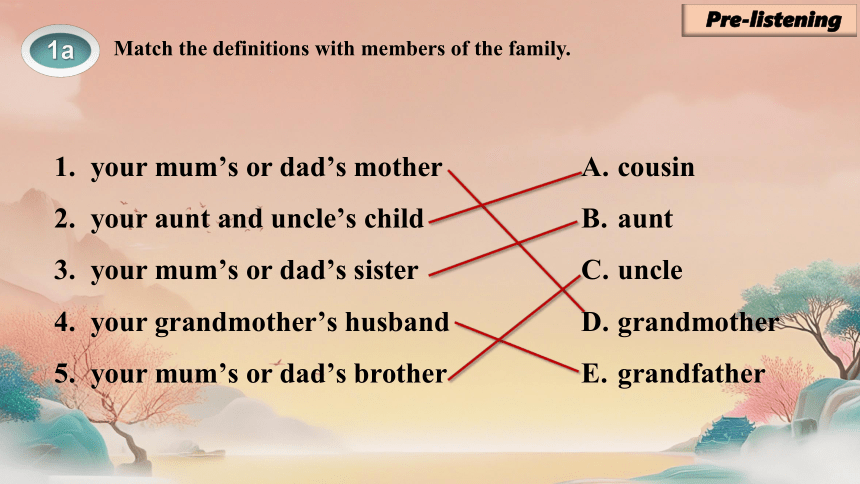
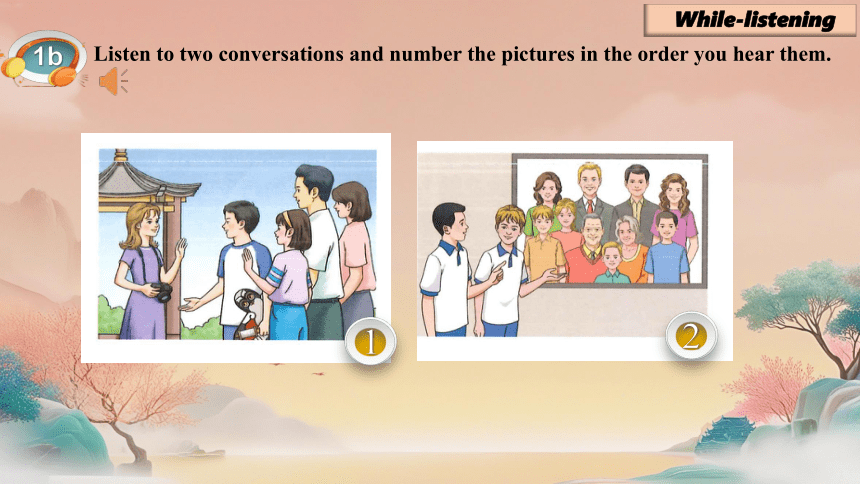
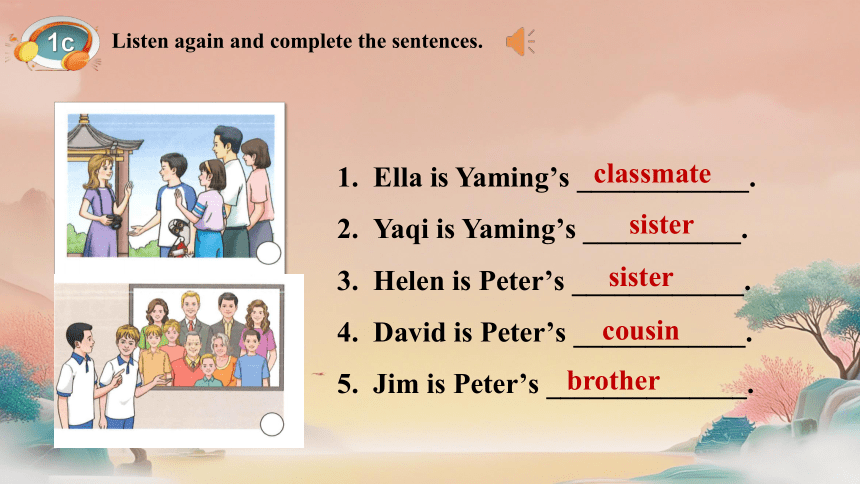
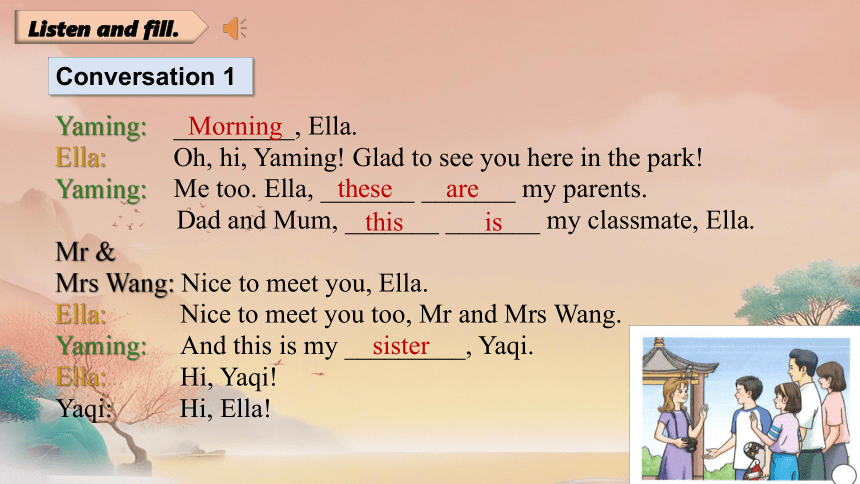
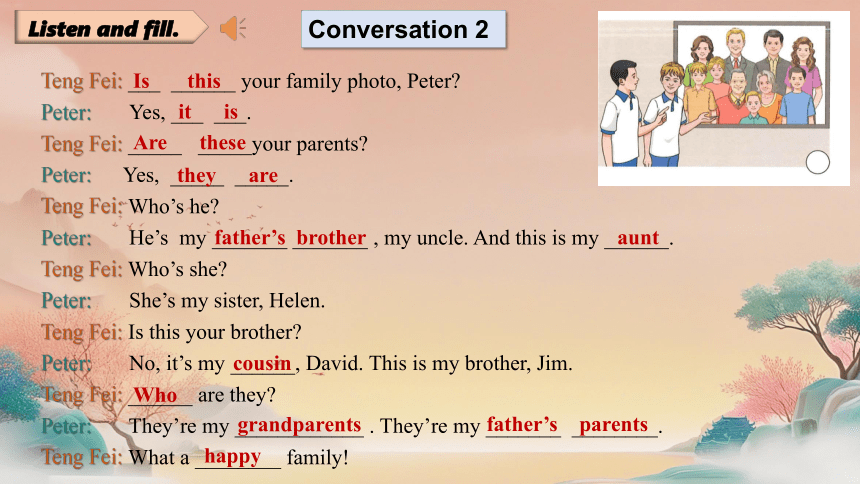
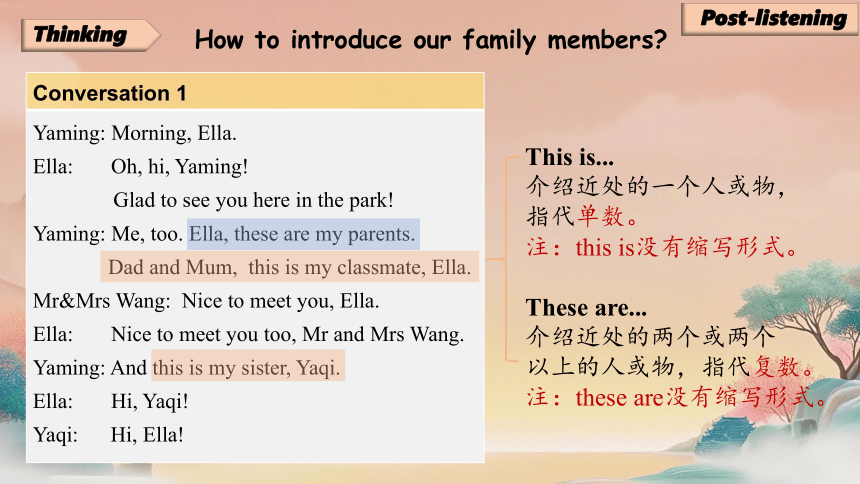
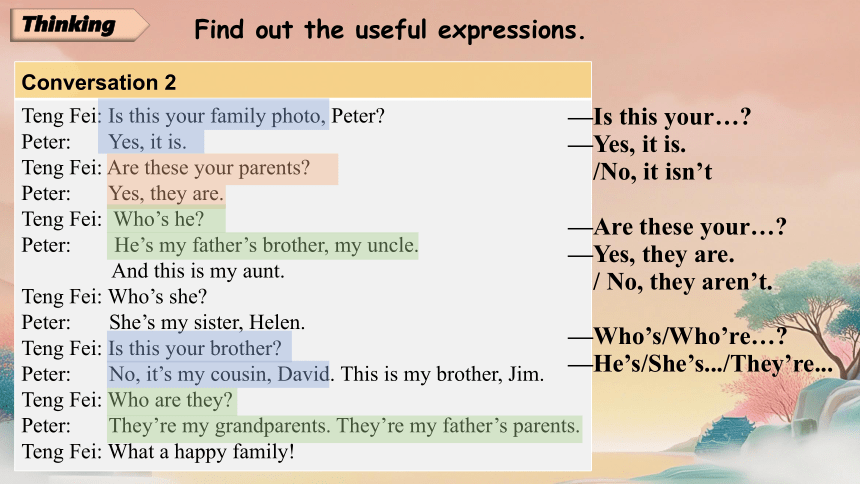

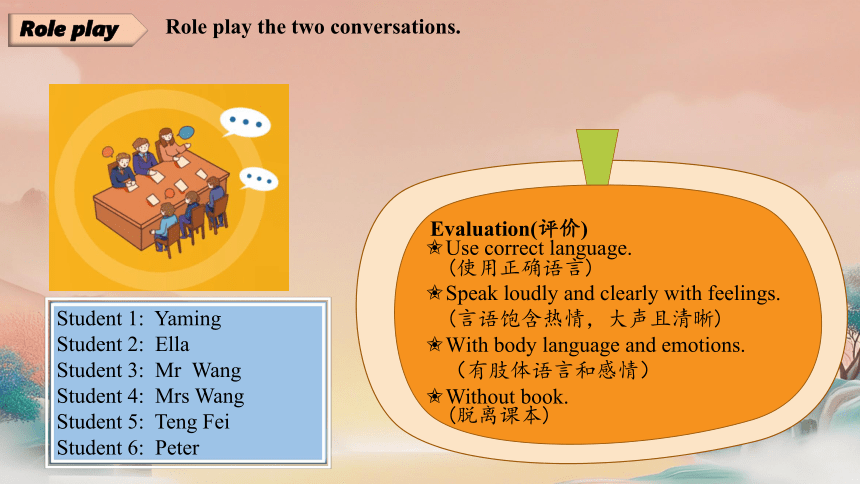
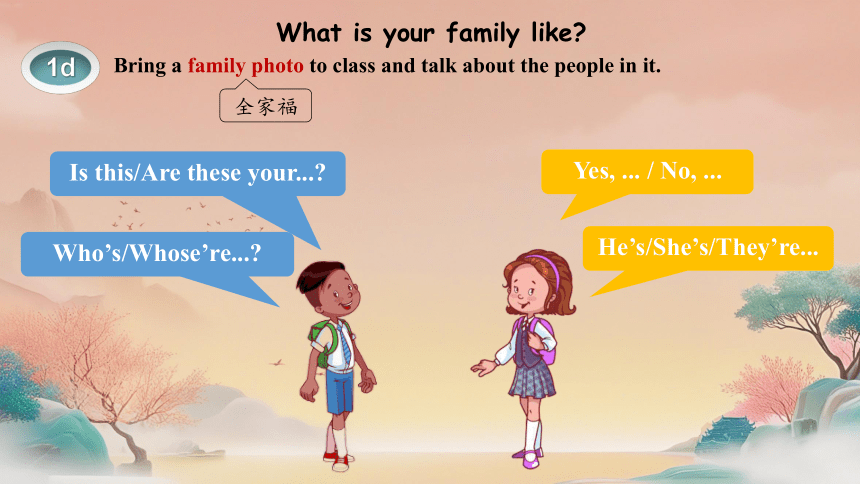
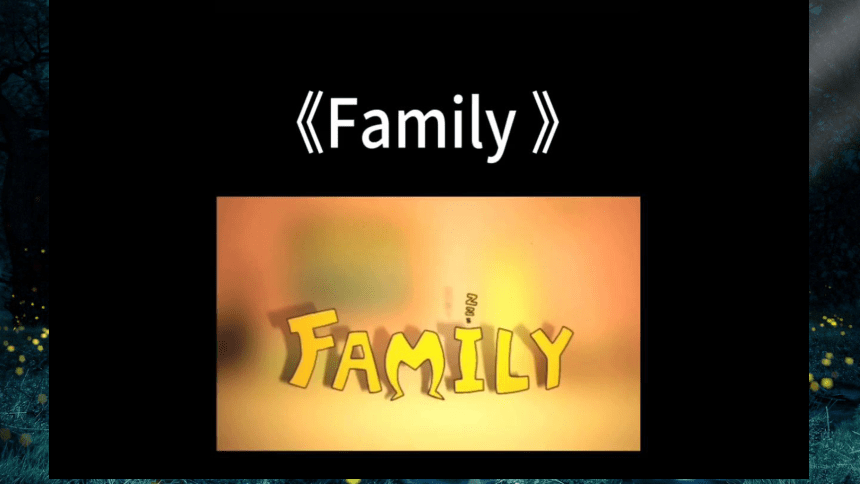
文档简介
(共66张PPT)
What is your family like
2024新教材
人教版七上
Section A
1a-2e
Unit 2 We’re !
Match the definitions with members of the family.
Pre-listening
1a
your mum’s or dad’s mother
your aunt and uncle’s child
your mum’s or dad’s sister
your grandmother’s husband
your mum’s or dad’s brother
cousin
aunt
uncle
grandmother
grandfather
2
1
Listen to two conversations and number the pictures in the order you hear them.
1b
While-listening
Ella is Yaming’s ____________.
Yaqi is Yaming’s ___________.
Helen is Peter’s ____________.
David is Peter’s ____________.
Jim is Peter’s ______________.
sister
cousin
brother
classmate
sister
Listen again and complete the sentences.
1c
Yaming: _________, Ella.
Ella: Oh, hi, Yaming! Glad to see you here in the park!
Yaming: Me too. Ella, _______ _______ my parents.
Dad and Mum, _______ _______ my classmate, Ella.
Mr &
Mrs Wang: Nice to meet you, Ella.
Ella: Nice to meet you too, Mr and Mrs Wang.
Yaming: And this is my _________, Yaqi.
Ella: Hi, Yaqi!
Yaqi: Hi, Ella!
Conversation 1
Listen and fill.
Morning
these are
this is
sister
Teng Fei: ___ ______ your family photo, Peter
Peter: Yes, ___ ___.
Teng Fei: _____ _____your parents
Peter: Yes, _____ _____.
Teng Fei: Who’s he
Peter: He’s my _______ _______ , my uncle. And this is my ______.
Teng Fei: Who’s she
Peter: She’s my sister, Helen.
Teng Fei: Is this your brother
Peter: No, it’s my ______, David. This is my brother, Jim.
Teng Fei: ______ are they
Peter: They’re my ____________ . They’re my _______ ________.
Teng Fei: What a ________ family!
Is this
it is
Are these
they are
father’s brother
aunt
father’s parents
happy
cousin
Who
grandparents
Conversation 2
Listen and fill.
Post-listening
How to introduce our family members
Thinking
Conversation 1
Yaming: Morning, Ella.
Ella: Oh, hi, Yaming!
Glad to see you here in the park!
Yaming: Me, too. Ella, these are my parents.
Dad and Mum, this is my classmate, Ella.
Mr&Mrs Wang: Nice to meet you, Ella.
Ella: Nice to meet you too, Mr and Mrs Wang.
Yaming: And this is my sister, Yaqi.
Ella: Hi, Yaqi!
Yaqi: Hi, Ella!
This is...
介绍近处的一个人或物,指代单数。
注:this is没有缩写形式。
These are...
介绍近处的两个或两个
以上的人或物,指代复数。
注:these are没有缩写形式。
Find out the useful expressions.
Thinking
Conversation 2
Teng Fei: Is this your family photo, Peter
Peter: Yes, it is.
Teng Fei: Are these your parents
Peter: Yes, they are.
Teng Fei: Who’s he
Peter: He’s my father’s brother, my uncle.
And this is my aunt.
Teng Fei: Who’s she
Peter: She’s my sister, Helen.
Teng Fei: Is this your brother
Peter: No, it’s my cousin, David. This is my brother, Jim.
Teng Fei: Who are they
Peter: They’re my grandparents. They’re my father’s parents.
Teng Fei: What a happy family!
—Is this your…
—Yes, it is.
/No, it isn’t
—Are these your…
—Yes, they are.
/ No, they aren’t.
—Who’s/Who’re…
—He’s/She’s.../They’re...
Watch and follow
Student 1: Yaming
Student 2: Ella
Student 3: Mr Wang
Student 4: Mrs Wang
Student 5: Teng Fei
Student 6: Peter
Role play
Role play the two conversations.
Evaluation(评价)
Use correct language.
(使用正确语言)
Speak loudly and clearly with feelings.
(言语饱含热情,大声且清晰)
With body language and emotions.
(有肢体语言和感情)
Without book.
(脱离课本)
Bring a family photo to class and talk about the people in it.
1d
全家福
Is this/Are these your...
Yes, ... / No, ...
Who’s/Whose’re...
He’s/She’s/They’re...
What is your family like
1.What is your family like
你的家庭是什么样的?(教材P28标题)
1. family n. 家庭;亲属
(包括父母和子女);家族;全家人。
其复数形式为families。
family指一个家庭作为一个整体概念时,作主语谓语动词用______。
指家庭成员时是集体名词,视为复数,作主语谓语动词用_______。
闯关练习:
1. My family _______(be) a big one.
2. My family _______(be) watching TV now.
Language ponits
单数
复数
is
are
1.What is your family like
你的家庭是什么样的?(教材P28标题)
1. What + be + sth./sb. like
某物是什么样的?/某人是什么样的?
该句型多用于询问某物的特征或某人的性格, 品质等。
e.g. —What’s your school like 你的学校是什么样的?
—It’s large and beautiful. 它又大又漂亮。
—What’s he like 他是个什么样的人?
—He is kind and outgoing. 他很友善,也很开朗。
拓展:What + be + sb. like 还可用于询问人的相貌。
同义表达为:What does sb. look like
e.g. —What is your maths teacher like
/What does your maths teacher look like
你的数学老师长什么样?
—He is tall and thin. 他又高又瘦。
Language ponits
2.Ella, these are my parents. Dad and Mum, this is my classmate, Ella.
埃拉,这是我的父母。爸爸妈妈,这是我的同学,埃拉。
(教材P28)
2. 介绍某人或某物的句型
注意:This is, These are 和Those are没有缩写形式,但是That is 可以缩写成That’s。
拓展:在电话用语中,通常用this表示“我”,
用that表示对方。
e.g. Hello! This is Lily. Is that Sally
喂!我是莉莉,你是萨利吗?
Language ponits
介绍一个人或物 介绍两个或两个以上的人或物
介绍近处的人或物 This is... 这是..... These are...
这(些)是......
介绍远处的人或物 That is... 那是....... Those are...
那(些)是......
3.Is this your family photo, Peter
—Yes, it is.
Are these your parents
—Yes, they are.
(教材P28)
3. Is this/that your sister
肯定回答: Yes, it is.
否定回答: No, it isn't.
注意:回答时, this/that 要用 it代替。
同样地, Are these/ those your ...
回答时, these/ those要用 they代替。
肯定回答: Yes, they are.
否定回答: No, they aren't.
闯关练习:—_______ my friend, Lucy.
—_______ my brothers, Sam and Tim.
A. This is; These are B. Is this; Are these
C. Are these; Is this D. These are; This is
Language ponits
A
Pronunciation
/ /
/ /
/ /
/ɑ /
Listen and repeat.
1
/ / / / / / /ɑ /
her sister duck dark
girl summer hut march
turn doctor much heart
请在这里输入您想输入的内容请在这里输入您想输入的内容请在这里输入您想输入的内容请在这里输入您想输入您请在这里输入您想输入的内容请在
输入标题
/ :/
发音要领:
/ :/为长元音。
发音时嘴巴半张,双唇扁平,向嘴角两边略拉开,舌身平放。舌部肌肉紧张,声带振动。
Practice:
her /h :/ 她的/她(宾格)
girl /ɡ :l/ 女孩
turn /t :n/ 转动
请在这里输入您想输入的内容请在这里输入您想输入的内容请在这里输入您想输入的内容请在这里输入您想输入您请在这里输入您想输入的内容请在
输入标题
发/ :/ 的字母组合:
/ :/
er ir or ur ear
er: her /h :/ 她的/她 person /'p :sn /人 term /t :m/ 学期 certain /'s :tn /某些
ir: shirt / t/ (男士)衬衫 bird /b d/ 鸟 skirt /sk t/ 短裙
or: word /w d/ 单词 world /w ld/ 世界 work /w k/ 工作
ur: hurt /h t/ 伤害 nurse /n s / 护士 turn /t n/ 转动
ear: early /' :li/ 早期的 earth / :θ/ 地球 learn /l :n/ 学习
请在这里输入您想输入的内容请在这里输入您想输入的内容请在这里输入您想输入的内容请在这里输入您想输入您请在这里输入您想输入的内容请在
输入标题
/ /
发音要领:
/ /为短元音。
发音时嘴巴微张,双唇扁平,舌身平放,舌中部稍抬起。口腔自然放松。
Practice:
sister /'sist / 姐, 妹
summer /'s m / 夏天
doctor / d kt / 医生
请在这里输入您想输入的内容请在这里输入您想输入的内容请在这里输入您想输入的内容请在这里输入您想输入您请在这里输入您想输入的内容请在
输入标题
发/ / 的字母&字母组合:
/ /
a e i o u er or ar
/ / a China /'t a n /中国 ago / 'ɡ /以前 panda /'p nd /熊猫
e open/' p n/打开 them / m/他们 cinema /'s n m /电影
i family/'f m li/家庭 holiday /'h l de /假期 terrible /'ter bl/可怕的
o today/'t 'de /今天 carrot/'k r t/胡萝卜 police/p 'li s/警方
u autumn/' t m/秋天 upon/ 'p n/在上面 album/' lb m/相册
er teacher/'ti t /老师 after/'ɑ ft /之后 driver/'dra v /司机
or doctor/'d kt /医生 actor/' kt /男演员 visitor/'v z t /游客
ar grammar/'ɡr m /语法 dollar/'d l /美元 popular/'p pj l /流行的
请在这里输入您想输入的内容请在这里输入您想输入的内容请在这里输入您想输入的内容请在这里输入您想输入您请在这里输入您想输入的内容请在
输入标题
/ /
发音要领:
/ /为短元音。
发音时嘴巴半张,舌中部抬起,舌尖抵住下齿,口形扁平。短促有力。
Practice:
duck /d k/ 鸭子
hut /h t/ 小屋
much /m t / 许多;非常
请在这里输入您想输入的内容请在这里输入您想输入的内容请在这里输入您想输入的内容请在这里输入您想输入您请在这里输入您想输入的内容请在
输入标题
发/ / 的字母&字母组合:
/ /
o u ou oo
o: mother /'m / 母亲 come /k m/来 love /l v/ 爱 money /'m ni/钱
u: bus /b s/ 公共汽车 but /b t/ 但是 jump /d mp/ 跳跃 cut /k t/ 切
oo: blood /bl d/ 血 flood /fl d/ 洪水
ou: cousin /'k zn/ 表妹 young /j / 年轻的 touch /t t / 触摸
请在这里输入您想输入的内容请在这里输入您想输入的内容请在这里输入您想输入的内容请在这里输入您想输入您请在这里输入您想输入的内容请在
输入标题
/ɑ /
发音要领:
/ɑ /为长元音。
发音时上下齿全部张开,嘴巴放松张大为圆形,舌身后缩,由喉部发类似“啊”的音。
Practice:
dark /dɑ k/ 黑暗的
march /mɑ t / 行军
heart /hɑ t/ 心
请在这里输入您想输入的内容请在这里输入您想输入的内容请在这里输入您想输入的内容请在这里输入您想输入您请在这里输入您想输入的内容请在
输入标题
发/ɑ / 的字母&字母组合:
/ɑ /
a ar au ear
a: after /'ɑ ft / 之后 father /'fɑ /父亲 ask /ɑ sk/ 问 plant /plɑ nt/植物
ar: art /ɑ t/ 美术 arm /ɑ m/ 手臂 card /kɑ d/ 卡片 guitar /ɡ 'tɑ (r)/吉他
ear: heart /hɑ t/ 心
au: aunt /ɑ nt/ 阿姨 laugh /lɑ f/ 笑
请在这里输入您想输入的内容请在这里输入您想输入的内容请在这里输入您想输入的内容请在这里输入您想输入您请在这里输入您想输入的内容请在
输入标题
将单词按发音归类(按照标红字母的发音归类)。
发/ /的单词
发/ /的单词
发/ɑ /的单词
发/ /的单词
提示:点击要选择的单词,
边读边点击。
dark
黑暗的
March三月
heart
心
much
许多
sister
姐/妹
after
之后
doctor
医生
summer
夏天
girl
女孩
turn
转动
term
学期
her
她
duck
鸭子
but
但是
根据读音选择单词。
( )1. A. today B. term C. turn
( )2. A. much B. burn C. boy
( )3. A. sister B. girl C. shirt
( )4. A. early B. heart C. earth
( )5. A. uncle B. aunt C. upon
Let’s practice
A
B
C
A
B
Listen and repeat.
2
likes loves watches lets reads
walks plays closes gets finds
Mike’s Ella’s Alice’s Kate’s Fred’s
/la ks/
/w ks/
/ma ks/
/l vz/
/ple z/
/'el z/
/'w t z/
/'kl z z/
/' l s z/
/ lets/
/ɡets/
/ke ts/
/ri dz/
/fa ndz/
/fredz/
Summarize the pronouncing rules of adding s or es at the end of words.
清辅音
后发/s/
浊辅音和
元音后发/z/
加-es结尾
的发/iz/
ts结尾
发/ts/
ds结尾
发/dz/
Listen and repeat. Notice the stressed syllables.
3
funny mother uncle cousin grandpa
begin about report because idea
1.
2.
/'f ni/
/'m /
/' kl/
/'k zn/
/'ɡr npɑ /
/b 'ɡ n/
/ 'ba t/
/r 'p rt/
/b 'k z/
/a 'di /
音节是语言中单个元音音素和辅音音素组合发音的最小语音单位,单个元音音素也可自成音节。即:有一个元音音素就构成一个音节。
成音节:是指某些辅音可以与其他辅音构成音节的现象。
英语中的 /l/、/m/、/n/就可以与前面的辅音构成成音节。 如:
/dn/,/pl/, /zn/, /tl/等。
音节是语言中单个元音音素和辅音音素组合发音的最小语音单位,单个元音音素也可自成音节。即:有一个元音音素就构成一个音节。
/'f ni/
/'m /
/' kl/
/'k zn/
/'ɡr npɑ /
/b 'ɡ n/
/ 'ba t/
/r 'p rt/
/b 'k z/
/a 'di /
数音节:下列音素有几个音节?
两个
两个
两个
(kl:成音节)
两个
(zn:成音节)
两个
两个
两个
(双元音/a /视为一个音节)
两个
两个
两个
(双元音/a /,/i /
被视为一个音节)
数音节
1. 单音节词,默认重读。
bird
/b d/
2. 双音节词,动2名1
(一般情况,动词的第二个音节重读;名词的第一个音节重读)。
mother v. 母亲
/'m /
3. 多音节词,倒数第3个音节重读。
activity
/ k't v ti/
音节重读
chess
/t es/
/b 'ɡ n/
begin v. 开始
/s n/
son
Let’s practice
朗读下列单词,注意重音。
cousin
/'k zn/
report
/r 'p rt/
/ 'mer k /
America
/'fe v r t/
favorite
I. 选出每组单词中画线部分读音与其他三个不同的一项。
( ) 1. A.yard B.start C.class D.bad
( ) 2. A.circle B.sir C.fur D.brother
( ) 3. A.conversation B.together C.hobby D.information
( ) 4. A.funny B.country C.use D.puppy
( ) 5. A.mean B.breath C.bread D.head
D
Exercises
D
C
C
A
II. 单选。
1. ______ is my mother and ______ are my aunts.
A. This; these B. This; that C. That; that D. These; this
2. —Here is a photo. Is this your mother —______.
A. Yes, this is B. Yes, it is C. No, this isn't D. Yes, she is
3. —______ is the girl under the tree —She is my sister.
A. Who B. What C. Where D. How
4. Today is September 10th. It's ______ Day.
A. Teacher B. Teacher's C. Teachers' D. Teachers
5. A good job means a good life ______ Jill.
A.for B. to C. with D. of
Exercises
A
B
A
C
B
—Is this Paul’s sister
—Yes, _____ _____.
And she loves _________ (read).
Let’s talk
This is __________ (Paul) family.
Paul’s
it is
reading
—Whose dall is this
—It’s __________ (Lucy).
—Whose camera is this
—It’s ______________ (Paul’s father).
He is a photographer(摄影师).
Let’s talk
Lucy’s
Paul’s father’s
—Does Paul’s dad travel
often with his job
—Yes, _____ ______.
he does
When he returns(返回)from his travels,
he _______ (spend) much time with his
family. They have ___________(a lot of)
fun together.
spends
a lot of
/spend/ v. 度过;
花(时间/钱)
a lot of = lots of
许多(可修饰可数/不可数名词)
/t 'ɡe (r)/ adv. 在一起;共同
Look at the picture and answer the following questions.
Prediction(预测)
1. What things can you see in the room?
2. Where are they
3. What are they talking about
They are at Teng Fei’s home.
They are talking about the things in the room.
ping-pong bat/b t/
乒乓球拍
fishing rod/r d/钓鱼竿
piano 钢琴
/pi' n /
Teng Fei: Hi, Peter! Come in. / Welcome.
Peter: Thanks. Oh, these ping-pong bats are nice.Whose are they
Teng Fei: Well, this is my ping-pong bat, and the black / red one is my grandpa's.
Peter: Do you often play ping-pong together
Teng Fei: Yes, we play every day /week. My grandpa loves sport.
Peter: Whose fishing rods are those
Teng Fei: They're my father's. He spends a lot of / lots of time fishing.
Peter: Hey, do you play the piano
Teng Fei: No, I don’t. It's my mother's piano. She can play it really / very well!
Listen to the conversation and circle the coloured words you hear.
2a
1. The ping-pong bat is Teng Fei’s and the black one is _______________.
2. Teng Fei often ________ ping-pong _______ his grandpa.
3. They play ping-pong together every _________.
His grandpa loves __________.
Read and fill
Teng Fei: Hi, Peter! Come in.
Peter: Thanks. Oh, these ping-pong bats are nice.Whose are they
Teng Fei: Well, this is my ping-pong bat, and the black one is my grandpa's.
Peter: Do you often play ping-pong together
Teng Fei: Yes, we play every week. My grandpa loves sport.
Peter: Whose fishing rods are those
Teng Fei: They're my father's. He spends a lot of time fishing.
Peter: Hey, do you play the piano
Teng Fei: No, I don’t. It's my mother's piano. She can play it really well!
his grandpa’s
plays with
week
sport
play with sth. 玩弄某物
e.g. Don’t play with your phone for too long. 不要玩手机太久。
play with sb. 同....一起玩耍
e.g. He likes to play with his friends after school. 他喜欢放学后和朋友一起玩。
4. The fishing rods is Teng Fei’s __________.
His father ______ a lot of time __________.
5. The piano is Teng Fei’s __________.
His mother can ______ the piano really _______.
Read and fill
Teng Fei: Hi, Peter! Come in.
Peter: Thanks. Oh, these ping-pong bats are nice.Whose are they
Teng Fei: Well, this is my ping-pong bat, and the black one is my grandpa's.
Peter: Do you often play ping-pong together
Teng Fei: Yes, we play every week. My grandpa loves sport.
Peter: Whose fishing rods are those
Teng Fei: They're my father's. He spends a lot of time fishing.
Peter: Hey, do you play the piano
Teng Fei: No, I don’t. It's my mother's piano. She can play it really well!
father’s
spends fishing
mother’s
play well
人+spend time + doing sth.
“某人花时间做某事”
Family member Thing Activity
Teng Fei ping-pong bat play ping-pong
Grandpa
Father
Mother
Read the conversation and complete the table about Teng Fei’s family.
2b
the black ping-pong bat
play ping-pong
fishing rods
fish
the piano
play the piano
/ k't v ti/ n. 活动
/'memb / n. 成员
Listen to the conversation again. Then role-play it.
2c
Teng Fei: Hi, Peter! Come in.
Peter: Thanks. Oh, these ping-pong bats are nice.Whose are they
Teng Fei: Well, this is my ping-pong bat, and the black one is my grandpa's.
Peter: Do you often play ping-pong together
Teng Fei: Yes, we play every week. My grandpa loves sport.
Peter: Whose fishing rods are those
Teng Fei: They're my father's. He spends a lot of time fishing.
Peter: Hey, do you play the piano
Teng Fei: No, I don’t. It's my mother's piano. She can play it really well!
请进,进来
乒乓球拍
play+球类
every week 每周(作状语)
every day 每天(作状语)
everyday adj.
每天的;日常的(作定语)
spend...time doing... 花费.....时间做.......
a lot of = lots of 许多(修饰可数/不可数名词)
play+the+乐器
/'ri: li/ adv. 非常;确实;真正地→ real adj.真的
Watch and follow
Hi, Peter! Come in.
Thanks. Oh, these ping-pong bats are nice.
Whose are they
提示:点击文本框可听录音。
Role play
Yes, we play every week. My grandpa loves sport.
Well, this is my ping-pong bat, and the black one is my grandpa's.
Do you often play ping-pong together
Whose fishing rods are those
提示:点击文本框可听录音。
No, I don’t. It's my mother's piano.
She can play it really well!
They're my father's. He spends a lot of time fishing.
Hey, do you play the piano
Role play
Evaluation(评价)
Use correct language.
(使用正确语言)
Speak loudly and clearly with feelings.
(大声且清晰,有感情)
Proper body language.
(适当的肢体语言)
Without book.
(脱离课本)
2d
often play basketball
read a lot
经常打篮球
读书很多/经常阅读
like Chinese chess
play the erhu well
like gardening
love animals
喜欢中国象棋
二胡拉得很好
喜欢园艺
爱动物
often play basketball
read a lot
like Chinese chess
play the erhu well
like gardening
love animals
Match the phrases in the box with the things in the photo.
花草
Use the photos to talk about Li Xin’s family.
2d
A: Whose erhu is this
B: It’s Li Xin’s erhu.
A: Does she play the erhu well
B: Yes, she does.
A: ...
Ask and answer
Pair work
A: Whose ______ this basketball
B: It’s Li Xin’s _____________.
A: Does he often play baketball
B: Yes, _____ ______.
A: Whose _____ these plants and flowers
B: _____ _____ Li Xin’s grandma’s.
A: Does she like gardening
B: Yes, _____ ______.
— Whose is/are + 物品
(Whose 物品+is this/are these )
—It’s sb.’s(+物品)/
/ They are sb.’s(+物品).
is
father’s
he does
are
They are
she does
Ask and answer
Pair work
— Whose is/are + 物品
(Whose 物品+is this/are these )
—It’s sb.’s(+物品)/
/ They are sb.’s(+物品).
A: _______ Chinese chess is this
B: It’s Li Xin’s grandpa’s.
A: Does he like playing Chinese chess
B: Yes, _____ ______.
A: Whose _______ are these
B: They are Li Xin’s ___________.
A: Does she read ___ _____
B: Yes, she does.
Whose
he does
books
mother’s
a lot
Ask and answer
Pair work
A: ________ pet dog is this
B: It’s Li Xin’s ___________.
A: Does he ______ animals
B: Yes, he does.
Whose
brother’s
love
2e
Bring some photos of things your family members have. In pairs, ask and answer questions about who owns each of them and the activities your family do.
Family activities
1. go for a picnic
2. play cards
3. ride bikes
4. grow a garden
5. watch films
6. learn to dance together
7. walk a pet dog
8. play sports
...
Summary
—Whose... is this/are these
—It’s / They are sb.’s(物品).
或
—Whose 物品+ is this/that
/are these/those
—It’s/ They are sb.’s(物品).
Talk about things:
How can we talk about family members’ things and activities
Talk about activities:
—Do you often…
—Yes, I/we... every week.
—Does he/she often...
—Yes, he/she does.
She/He spends time+doing sth.
He/She loves/likes (doing) sth.
He/She can... really well.
Are Teng Fei’s family and Li Xin’s family the same
Different family members.
Different activities.
But the same love.
Family is the harbor(港湾) of love.
请在这里输入您想输入的内容请在这里输入您想输入的内容请在这里输入您想输入的内容请在这里输入您想输入您请在这里输入您想输入的内容请在
输入标题
Language points
whose adj. & pron.谁的 用来询问物品的所属关系。
(1)用作代词时,其后不接名词;
用作形容词时,其后要接名词。
e.g. Whose is this car 这辆车是谁的?(作代词)
Whose car is this 这是谁的车?(作形容词)
(2)对物主代词或名词所有格提问通常用whose。
①被提问部分作定语时,用
“Whose +名词 +be+主语?”结构。
This is Mary's hair band. 这是玛丽的发带。
→___________________________ 这是谁的发带?
②被提问部分作表语时,用
“Whose+be +主语?”结构。
This pen is mine. 这支钢笔是我的。
→___________________________ 这支钢笔是谁的?
1. —Whose are they
它们是谁的?
—Well, this is my ping-pong bat...
嗯,这是我的乒乓球拍......
(教材P29 2a)
注:whose=who’s
who’s = who is
Whose hair band is this
Whose is this pen
请在这里输入您想输入的内容请在这里输入您想输入的内容请在这里输入您想输入的内容请在这里输入您想输入您请在这里输入您想输入的内容请在
输入标题
Language points
spend v.花(时间、钱等),过去式为spent
其主语通常是人,常用于以下结构:
①sb. spends time/money doing sth.
某人花费时间/金钱做某事
②sb. spends time/money on sth.
在某事上花费时间/金钱
e.g.
Simon spends 2 hours ________ the piano everyday.
西蒙每天花两个小时弹钢琴。
I spent 69 yuan ______ this T-shirt.
我花69元买了这件T恤衫。
2. He spends a lot of/lots of time fishing.
他花很多时间钓鱼。
(教材P29 2a)
playing
on
请在这里输入您想输入的内容请在这里输入您想输入的内容请在这里输入您想输入的内容请在这里输入您想输入您请在这里输入您想输入的内容请在
输入标题
Language points
辨析:many, much, a lot of/lots of, a lot
闯关练习:用many, much, a lot of/lots of, a lot填空
1. There are ____________ apples in the fridge.
2. My mother spends _______ time reading at night.
3. Thanks _________ for helping me.
3. He spends a lot of time fishing.
他花很多时间钓鱼。
Li Xin’s mother reads a lot.
李欣的妈妈读了很多书。
(教材P29&30 2a&2d)
许多 many +可数名词复数
much +不可数名词复数
a lot of = lots of +可数名词复数
/不可数名词
很;非常 a lot 修饰动词, 位于动词之后
many/lots of
much
a lot
请在这里输入您想输入的内容请在这里输入您想输入的内容请在这里输入您想输入的内容请在这里输入您想输入您请在这里输入您想输入的内容请在
输入标题
Language points
really adv. 非常;确实;真正地
常用来修饰形容词、动词或副词等,作状语。
一般放在形容词、副词或动词之前,系动词之后。
e.g. It is really nice of you to help me.
你能帮我真是太好了。(修饰形容词)
I _______ _______ music.
我真的喜欢音乐。(修饰动词)
real adj. 真(实)的 e.g. a real story 一个真实的故事
拓展:really用于口语中,在答话时表示
感兴趣或惊讶,后加问号,读时用升调。
—It's June 9th today. It's Lucy's birthday.
今天是6月9日,是露西的生日。
—Oh, really Let's buy a present for her.
哦,真的吗 我们给她买份礼物吧。
4. She can play it really well!
她弹得非常好!(really修饰副词well)
(教材P29 2a)
really like
请在这里输入您想输入的内容请在这里输入您想输入的内容请在这里输入您想输入的内容请在这里输入您想输入您请在这里输入您想输入的内容请在
输入标题
Language points
well adv. 好;令人满意地。常用来修饰动词。
e.g. Steve learns English ________.
史蒂夫英语学得很好。
拓展:
4. She can play it really well!
她弹得非常好!(really修饰副词well)
(教材P29 2a)
good adj. 好的 修饰名词, 位于名词前
well adv.好地 修饰动词、形容词、副词
well adj. 健康的 I don't feel well.
我感觉身体不太好。
n. 水井 The well is very deep.
这口井很深。
inter. 嗯,好吧 Well, you may be right.
好吧,你也许是对的。
well
I. 从方框内选择适当的词并用其正确形式填空。
1. I don’t have ping-pong ________, so I can’t play ping-pong with you.
2. My mother ________ much money on books every year.
3. My brother loves ________ and he runs every day.
4. I often play basketball _________ with my classmates after school.
5. My sister ________ loves music and she listens to music every day.
bats
Exercises
bat spend really together sport
spends
sport
together
really
II. 单选。
1. —Do you like to play ______ piano
—No, I like to play ______ erhu with my friends.
A. a; the B. the; / C. the; the D. /; the
2. There are ______ vegetables in the fridge.
A. a lot B. lot of C. lots of D. a lots of
3. Tom spends two hours ______ his homework every day.
A. doing B. to do C. do D.to doing
4. — ______ book is it —It’s my mother’s.
A. Who B. Where C. What D. Whose
5. She likes English and she can speak it ______ well.
A. really B. much C. just D. too
Exercises
C
C
A
D
A
Homework
Must do
1. Copy and remember the
new words and phrases.
2. Finish the workbook of
Section A.
3. Preview Grammar Focus.
Choose to do
Bring a photo of your family and describe the things and activities of your family members.
How well can you do these things Very well OK Needs work
1. I can talk about the things of family members.
2. I can talk about family activities.
3. I can use whose to ask questions.
4. I can use the sentence structures in the text.
Reflecting
Thank you!
What is your family like
2024新教材
人教版七上
Section A
1a-2e
Unit 2 We’re !
Match the definitions with members of the family.
Pre-listening
1a
your mum’s or dad’s mother
your aunt and uncle’s child
your mum’s or dad’s sister
your grandmother’s husband
your mum’s or dad’s brother
cousin
aunt
uncle
grandmother
grandfather
2
1
Listen to two conversations and number the pictures in the order you hear them.
1b
While-listening
Ella is Yaming’s ____________.
Yaqi is Yaming’s ___________.
Helen is Peter’s ____________.
David is Peter’s ____________.
Jim is Peter’s ______________.
sister
cousin
brother
classmate
sister
Listen again and complete the sentences.
1c
Yaming: _________, Ella.
Ella: Oh, hi, Yaming! Glad to see you here in the park!
Yaming: Me too. Ella, _______ _______ my parents.
Dad and Mum, _______ _______ my classmate, Ella.
Mr &
Mrs Wang: Nice to meet you, Ella.
Ella: Nice to meet you too, Mr and Mrs Wang.
Yaming: And this is my _________, Yaqi.
Ella: Hi, Yaqi!
Yaqi: Hi, Ella!
Conversation 1
Listen and fill.
Morning
these are
this is
sister
Teng Fei: ___ ______ your family photo, Peter
Peter: Yes, ___ ___.
Teng Fei: _____ _____your parents
Peter: Yes, _____ _____.
Teng Fei: Who’s he
Peter: He’s my _______ _______ , my uncle. And this is my ______.
Teng Fei: Who’s she
Peter: She’s my sister, Helen.
Teng Fei: Is this your brother
Peter: No, it’s my ______, David. This is my brother, Jim.
Teng Fei: ______ are they
Peter: They’re my ____________ . They’re my _______ ________.
Teng Fei: What a ________ family!
Is this
it is
Are these
they are
father’s brother
aunt
father’s parents
happy
cousin
Who
grandparents
Conversation 2
Listen and fill.
Post-listening
How to introduce our family members
Thinking
Conversation 1
Yaming: Morning, Ella.
Ella: Oh, hi, Yaming!
Glad to see you here in the park!
Yaming: Me, too. Ella, these are my parents.
Dad and Mum, this is my classmate, Ella.
Mr&Mrs Wang: Nice to meet you, Ella.
Ella: Nice to meet you too, Mr and Mrs Wang.
Yaming: And this is my sister, Yaqi.
Ella: Hi, Yaqi!
Yaqi: Hi, Ella!
This is...
介绍近处的一个人或物,指代单数。
注:this is没有缩写形式。
These are...
介绍近处的两个或两个
以上的人或物,指代复数。
注:these are没有缩写形式。
Find out the useful expressions.
Thinking
Conversation 2
Teng Fei: Is this your family photo, Peter
Peter: Yes, it is.
Teng Fei: Are these your parents
Peter: Yes, they are.
Teng Fei: Who’s he
Peter: He’s my father’s brother, my uncle.
And this is my aunt.
Teng Fei: Who’s she
Peter: She’s my sister, Helen.
Teng Fei: Is this your brother
Peter: No, it’s my cousin, David. This is my brother, Jim.
Teng Fei: Who are they
Peter: They’re my grandparents. They’re my father’s parents.
Teng Fei: What a happy family!
—Is this your…
—Yes, it is.
/No, it isn’t
—Are these your…
—Yes, they are.
/ No, they aren’t.
—Who’s/Who’re…
—He’s/She’s.../They’re...
Watch and follow
Student 1: Yaming
Student 2: Ella
Student 3: Mr Wang
Student 4: Mrs Wang
Student 5: Teng Fei
Student 6: Peter
Role play
Role play the two conversations.
Evaluation(评价)
Use correct language.
(使用正确语言)
Speak loudly and clearly with feelings.
(言语饱含热情,大声且清晰)
With body language and emotions.
(有肢体语言和感情)
Without book.
(脱离课本)
Bring a family photo to class and talk about the people in it.
1d
全家福
Is this/Are these your...
Yes, ... / No, ...
Who’s/Whose’re...
He’s/She’s/They’re...
What is your family like
1.What is your family like
你的家庭是什么样的?(教材P28标题)
1. family n. 家庭;亲属
(包括父母和子女);家族;全家人。
其复数形式为families。
family指一个家庭作为一个整体概念时,作主语谓语动词用______。
指家庭成员时是集体名词,视为复数,作主语谓语动词用_______。
闯关练习:
1. My family _______(be) a big one.
2. My family _______(be) watching TV now.
Language ponits
单数
复数
is
are
1.What is your family like
你的家庭是什么样的?(教材P28标题)
1. What + be + sth./sb. like
某物是什么样的?/某人是什么样的?
该句型多用于询问某物的特征或某人的性格, 品质等。
e.g. —What’s your school like 你的学校是什么样的?
—It’s large and beautiful. 它又大又漂亮。
—What’s he like 他是个什么样的人?
—He is kind and outgoing. 他很友善,也很开朗。
拓展:What + be + sb. like 还可用于询问人的相貌。
同义表达为:What does sb. look like
e.g. —What is your maths teacher like
/What does your maths teacher look like
你的数学老师长什么样?
—He is tall and thin. 他又高又瘦。
Language ponits
2.Ella, these are my parents. Dad and Mum, this is my classmate, Ella.
埃拉,这是我的父母。爸爸妈妈,这是我的同学,埃拉。
(教材P28)
2. 介绍某人或某物的句型
注意:This is, These are 和Those are没有缩写形式,但是That is 可以缩写成That’s。
拓展:在电话用语中,通常用this表示“我”,
用that表示对方。
e.g. Hello! This is Lily. Is that Sally
喂!我是莉莉,你是萨利吗?
Language ponits
介绍一个人或物 介绍两个或两个以上的人或物
介绍近处的人或物 This is... 这是..... These are...
这(些)是......
介绍远处的人或物 That is... 那是....... Those are...
那(些)是......
3.Is this your family photo, Peter
—Yes, it is.
Are these your parents
—Yes, they are.
(教材P28)
3. Is this/that your sister
肯定回答: Yes, it is.
否定回答: No, it isn't.
注意:回答时, this/that 要用 it代替。
同样地, Are these/ those your ...
回答时, these/ those要用 they代替。
肯定回答: Yes, they are.
否定回答: No, they aren't.
闯关练习:—_______ my friend, Lucy.
—_______ my brothers, Sam and Tim.
A. This is; These are B. Is this; Are these
C. Are these; Is this D. These are; This is
Language ponits
A
Pronunciation
/ /
/ /
/ /
/ɑ /
Listen and repeat.
1
/ / / / / / /ɑ /
her sister duck dark
girl summer hut march
turn doctor much heart
请在这里输入您想输入的内容请在这里输入您想输入的内容请在这里输入您想输入的内容请在这里输入您想输入您请在这里输入您想输入的内容请在
输入标题
/ :/
发音要领:
/ :/为长元音。
发音时嘴巴半张,双唇扁平,向嘴角两边略拉开,舌身平放。舌部肌肉紧张,声带振动。
Practice:
her /h :/ 她的/她(宾格)
girl /ɡ :l/ 女孩
turn /t :n/ 转动
请在这里输入您想输入的内容请在这里输入您想输入的内容请在这里输入您想输入的内容请在这里输入您想输入您请在这里输入您想输入的内容请在
输入标题
发/ :/ 的字母组合:
/ :/
er ir or ur ear
er: her /h :/ 她的/她 person /'p :sn /人 term /t :m/ 学期 certain /'s :tn /某些
ir: shirt / t/ (男士)衬衫 bird /b d/ 鸟 skirt /sk t/ 短裙
or: word /w d/ 单词 world /w ld/ 世界 work /w k/ 工作
ur: hurt /h t/ 伤害 nurse /n s / 护士 turn /t n/ 转动
ear: early /' :li/ 早期的 earth / :θ/ 地球 learn /l :n/ 学习
请在这里输入您想输入的内容请在这里输入您想输入的内容请在这里输入您想输入的内容请在这里输入您想输入您请在这里输入您想输入的内容请在
输入标题
/ /
发音要领:
/ /为短元音。
发音时嘴巴微张,双唇扁平,舌身平放,舌中部稍抬起。口腔自然放松。
Practice:
sister /'sist / 姐, 妹
summer /'s m / 夏天
doctor / d kt / 医生
请在这里输入您想输入的内容请在这里输入您想输入的内容请在这里输入您想输入的内容请在这里输入您想输入您请在这里输入您想输入的内容请在
输入标题
发/ / 的字母&字母组合:
/ /
a e i o u er or ar
/ / a China /'t a n /中国 ago / 'ɡ /以前 panda /'p nd /熊猫
e open/' p n/打开 them / m/他们 cinema /'s n m /电影
i family/'f m li/家庭 holiday /'h l de /假期 terrible /'ter bl/可怕的
o today/'t 'de /今天 carrot/'k r t/胡萝卜 police/p 'li s/警方
u autumn/' t m/秋天 upon/ 'p n/在上面 album/' lb m/相册
er teacher/'ti t /老师 after/'ɑ ft /之后 driver/'dra v /司机
or doctor/'d kt /医生 actor/' kt /男演员 visitor/'v z t /游客
ar grammar/'ɡr m /语法 dollar/'d l /美元 popular/'p pj l /流行的
请在这里输入您想输入的内容请在这里输入您想输入的内容请在这里输入您想输入的内容请在这里输入您想输入您请在这里输入您想输入的内容请在
输入标题
/ /
发音要领:
/ /为短元音。
发音时嘴巴半张,舌中部抬起,舌尖抵住下齿,口形扁平。短促有力。
Practice:
duck /d k/ 鸭子
hut /h t/ 小屋
much /m t / 许多;非常
请在这里输入您想输入的内容请在这里输入您想输入的内容请在这里输入您想输入的内容请在这里输入您想输入您请在这里输入您想输入的内容请在
输入标题
发/ / 的字母&字母组合:
/ /
o u ou oo
o: mother /'m / 母亲 come /k m/来 love /l v/ 爱 money /'m ni/钱
u: bus /b s/ 公共汽车 but /b t/ 但是 jump /d mp/ 跳跃 cut /k t/ 切
oo: blood /bl d/ 血 flood /fl d/ 洪水
ou: cousin /'k zn/ 表妹 young /j / 年轻的 touch /t t / 触摸
请在这里输入您想输入的内容请在这里输入您想输入的内容请在这里输入您想输入的内容请在这里输入您想输入您请在这里输入您想输入的内容请在
输入标题
/ɑ /
发音要领:
/ɑ /为长元音。
发音时上下齿全部张开,嘴巴放松张大为圆形,舌身后缩,由喉部发类似“啊”的音。
Practice:
dark /dɑ k/ 黑暗的
march /mɑ t / 行军
heart /hɑ t/ 心
请在这里输入您想输入的内容请在这里输入您想输入的内容请在这里输入您想输入的内容请在这里输入您想输入您请在这里输入您想输入的内容请在
输入标题
发/ɑ / 的字母&字母组合:
/ɑ /
a ar au ear
a: after /'ɑ ft / 之后 father /'fɑ /父亲 ask /ɑ sk/ 问 plant /plɑ nt/植物
ar: art /ɑ t/ 美术 arm /ɑ m/ 手臂 card /kɑ d/ 卡片 guitar /ɡ 'tɑ (r)/吉他
ear: heart /hɑ t/ 心
au: aunt /ɑ nt/ 阿姨 laugh /lɑ f/ 笑
请在这里输入您想输入的内容请在这里输入您想输入的内容请在这里输入您想输入的内容请在这里输入您想输入您请在这里输入您想输入的内容请在
输入标题
将单词按发音归类(按照标红字母的发音归类)。
发/ /的单词
发/ /的单词
发/ɑ /的单词
发/ /的单词
提示:点击要选择的单词,
边读边点击。
dark
黑暗的
March三月
heart
心
much
许多
sister
姐/妹
after
之后
doctor
医生
summer
夏天
girl
女孩
turn
转动
term
学期
her
她
duck
鸭子
but
但是
根据读音选择单词。
( )1. A. today B. term C. turn
( )2. A. much B. burn C. boy
( )3. A. sister B. girl C. shirt
( )4. A. early B. heart C. earth
( )5. A. uncle B. aunt C. upon
Let’s practice
A
B
C
A
B
Listen and repeat.
2
likes loves watches lets reads
walks plays closes gets finds
Mike’s Ella’s Alice’s Kate’s Fred’s
/la ks/
/w ks/
/ma ks/
/l vz/
/ple z/
/'el z/
/'w t z/
/'kl z z/
/' l s z/
/ lets/
/ɡets/
/ke ts/
/ri dz/
/fa ndz/
/fredz/
Summarize the pronouncing rules of adding s or es at the end of words.
清辅音
后发/s/
浊辅音和
元音后发/z/
加-es结尾
的发/iz/
ts结尾
发/ts/
ds结尾
发/dz/
Listen and repeat. Notice the stressed syllables.
3
funny mother uncle cousin grandpa
begin about report because idea
1.
2.
/'f ni/
/'m /
/' kl/
/'k zn/
/'ɡr npɑ /
/b 'ɡ n/
/ 'ba t/
/r 'p rt/
/b 'k z/
/a 'di /
音节是语言中单个元音音素和辅音音素组合发音的最小语音单位,单个元音音素也可自成音节。即:有一个元音音素就构成一个音节。
成音节:是指某些辅音可以与其他辅音构成音节的现象。
英语中的 /l/、/m/、/n/就可以与前面的辅音构成成音节。 如:
/dn/,/pl/, /zn/, /tl/等。
音节是语言中单个元音音素和辅音音素组合发音的最小语音单位,单个元音音素也可自成音节。即:有一个元音音素就构成一个音节。
/'f ni/
/'m /
/' kl/
/'k zn/
/'ɡr npɑ /
/b 'ɡ n/
/ 'ba t/
/r 'p rt/
/b 'k z/
/a 'di /
数音节:下列音素有几个音节?
两个
两个
两个
(kl:成音节)
两个
(zn:成音节)
两个
两个
两个
(双元音/a /视为一个音节)
两个
两个
两个
(双元音/a /,/i /
被视为一个音节)
数音节
1. 单音节词,默认重读。
bird
/b d/
2. 双音节词,动2名1
(一般情况,动词的第二个音节重读;名词的第一个音节重读)。
mother v. 母亲
/'m /
3. 多音节词,倒数第3个音节重读。
activity
/ k't v ti/
音节重读
chess
/t es/
/b 'ɡ n/
begin v. 开始
/s n/
son
Let’s practice
朗读下列单词,注意重音。
cousin
/'k zn/
report
/r 'p rt/
/ 'mer k /
America
/'fe v r t/
favorite
I. 选出每组单词中画线部分读音与其他三个不同的一项。
( ) 1. A.yard B.start C.class D.bad
( ) 2. A.circle B.sir C.fur D.brother
( ) 3. A.conversation B.together C.hobby D.information
( ) 4. A.funny B.country C.use D.puppy
( ) 5. A.mean B.breath C.bread D.head
D
Exercises
D
C
C
A
II. 单选。
1. ______ is my mother and ______ are my aunts.
A. This; these B. This; that C. That; that D. These; this
2. —Here is a photo. Is this your mother —______.
A. Yes, this is B. Yes, it is C. No, this isn't D. Yes, she is
3. —______ is the girl under the tree —She is my sister.
A. Who B. What C. Where D. How
4. Today is September 10th. It's ______ Day.
A. Teacher B. Teacher's C. Teachers' D. Teachers
5. A good job means a good life ______ Jill.
A.for B. to C. with D. of
Exercises
A
B
A
C
B
—Is this Paul’s sister
—Yes, _____ _____.
And she loves _________ (read).
Let’s talk
This is __________ (Paul) family.
Paul’s
it is
reading
—Whose dall is this
—It’s __________ (Lucy).
—Whose camera is this
—It’s ______________ (Paul’s father).
He is a photographer(摄影师).
Let’s talk
Lucy’s
Paul’s father’s
—Does Paul’s dad travel
often with his job
—Yes, _____ ______.
he does
When he returns(返回)from his travels,
he _______ (spend) much time with his
family. They have ___________(a lot of)
fun together.
spends
a lot of
/spend/ v. 度过;
花(时间/钱)
a lot of = lots of
许多(可修饰可数/不可数名词)
/t 'ɡe (r)/ adv. 在一起;共同
Look at the picture and answer the following questions.
Prediction(预测)
1. What things can you see in the room?
2. Where are they
3. What are they talking about
They are at Teng Fei’s home.
They are talking about the things in the room.
ping-pong bat/b t/
乒乓球拍
fishing rod/r d/钓鱼竿
piano 钢琴
/pi' n /
Teng Fei: Hi, Peter! Come in. / Welcome.
Peter: Thanks. Oh, these ping-pong bats are nice.Whose are they
Teng Fei: Well, this is my ping-pong bat, and the black / red one is my grandpa's.
Peter: Do you often play ping-pong together
Teng Fei: Yes, we play every day /week. My grandpa loves sport.
Peter: Whose fishing rods are those
Teng Fei: They're my father's. He spends a lot of / lots of time fishing.
Peter: Hey, do you play the piano
Teng Fei: No, I don’t. It's my mother's piano. She can play it really / very well!
Listen to the conversation and circle the coloured words you hear.
2a
1. The ping-pong bat is Teng Fei’s and the black one is _______________.
2. Teng Fei often ________ ping-pong _______ his grandpa.
3. They play ping-pong together every _________.
His grandpa loves __________.
Read and fill
Teng Fei: Hi, Peter! Come in.
Peter: Thanks. Oh, these ping-pong bats are nice.Whose are they
Teng Fei: Well, this is my ping-pong bat, and the black one is my grandpa's.
Peter: Do you often play ping-pong together
Teng Fei: Yes, we play every week. My grandpa loves sport.
Peter: Whose fishing rods are those
Teng Fei: They're my father's. He spends a lot of time fishing.
Peter: Hey, do you play the piano
Teng Fei: No, I don’t. It's my mother's piano. She can play it really well!
his grandpa’s
plays with
week
sport
play with sth. 玩弄某物
e.g. Don’t play with your phone for too long. 不要玩手机太久。
play with sb. 同....一起玩耍
e.g. He likes to play with his friends after school. 他喜欢放学后和朋友一起玩。
4. The fishing rods is Teng Fei’s __________.
His father ______ a lot of time __________.
5. The piano is Teng Fei’s __________.
His mother can ______ the piano really _______.
Read and fill
Teng Fei: Hi, Peter! Come in.
Peter: Thanks. Oh, these ping-pong bats are nice.Whose are they
Teng Fei: Well, this is my ping-pong bat, and the black one is my grandpa's.
Peter: Do you often play ping-pong together
Teng Fei: Yes, we play every week. My grandpa loves sport.
Peter: Whose fishing rods are those
Teng Fei: They're my father's. He spends a lot of time fishing.
Peter: Hey, do you play the piano
Teng Fei: No, I don’t. It's my mother's piano. She can play it really well!
father’s
spends fishing
mother’s
play well
人+spend time + doing sth.
“某人花时间做某事”
Family member Thing Activity
Teng Fei ping-pong bat play ping-pong
Grandpa
Father
Mother
Read the conversation and complete the table about Teng Fei’s family.
2b
the black ping-pong bat
play ping-pong
fishing rods
fish
the piano
play the piano
/ k't v ti/ n. 活动
/'memb / n. 成员
Listen to the conversation again. Then role-play it.
2c
Teng Fei: Hi, Peter! Come in.
Peter: Thanks. Oh, these ping-pong bats are nice.Whose are they
Teng Fei: Well, this is my ping-pong bat, and the black one is my grandpa's.
Peter: Do you often play ping-pong together
Teng Fei: Yes, we play every week. My grandpa loves sport.
Peter: Whose fishing rods are those
Teng Fei: They're my father's. He spends a lot of time fishing.
Peter: Hey, do you play the piano
Teng Fei: No, I don’t. It's my mother's piano. She can play it really well!
请进,进来
乒乓球拍
play+球类
every week 每周(作状语)
every day 每天(作状语)
everyday adj.
每天的;日常的(作定语)
spend...time doing... 花费.....时间做.......
a lot of = lots of 许多(修饰可数/不可数名词)
play+the+乐器
/'ri: li/ adv. 非常;确实;真正地→ real adj.真的
Watch and follow
Hi, Peter! Come in.
Thanks. Oh, these ping-pong bats are nice.
Whose are they
提示:点击文本框可听录音。
Role play
Yes, we play every week. My grandpa loves sport.
Well, this is my ping-pong bat, and the black one is my grandpa's.
Do you often play ping-pong together
Whose fishing rods are those
提示:点击文本框可听录音。
No, I don’t. It's my mother's piano.
She can play it really well!
They're my father's. He spends a lot of time fishing.
Hey, do you play the piano
Role play
Evaluation(评价)
Use correct language.
(使用正确语言)
Speak loudly and clearly with feelings.
(大声且清晰,有感情)
Proper body language.
(适当的肢体语言)
Without book.
(脱离课本)
2d
often play basketball
read a lot
经常打篮球
读书很多/经常阅读
like Chinese chess
play the erhu well
like gardening
love animals
喜欢中国象棋
二胡拉得很好
喜欢园艺
爱动物
often play basketball
read a lot
like Chinese chess
play the erhu well
like gardening
love animals
Match the phrases in the box with the things in the photo.
花草
Use the photos to talk about Li Xin’s family.
2d
A: Whose erhu is this
B: It’s Li Xin’s erhu.
A: Does she play the erhu well
B: Yes, she does.
A: ...
Ask and answer
Pair work
A: Whose ______ this basketball
B: It’s Li Xin’s _____________.
A: Does he often play baketball
B: Yes, _____ ______.
A: Whose _____ these plants and flowers
B: _____ _____ Li Xin’s grandma’s.
A: Does she like gardening
B: Yes, _____ ______.
— Whose is/are + 物品
(Whose 物品+is this/are these )
—It’s sb.’s(+物品)/
/ They are sb.’s(+物品).
is
father’s
he does
are
They are
she does
Ask and answer
Pair work
— Whose is/are + 物品
(Whose 物品+is this/are these )
—It’s sb.’s(+物品)/
/ They are sb.’s(+物品).
A: _______ Chinese chess is this
B: It’s Li Xin’s grandpa’s.
A: Does he like playing Chinese chess
B: Yes, _____ ______.
A: Whose _______ are these
B: They are Li Xin’s ___________.
A: Does she read ___ _____
B: Yes, she does.
Whose
he does
books
mother’s
a lot
Ask and answer
Pair work
A: ________ pet dog is this
B: It’s Li Xin’s ___________.
A: Does he ______ animals
B: Yes, he does.
Whose
brother’s
love
2e
Bring some photos of things your family members have. In pairs, ask and answer questions about who owns each of them and the activities your family do.
Family activities
1. go for a picnic
2. play cards
3. ride bikes
4. grow a garden
5. watch films
6. learn to dance together
7. walk a pet dog
8. play sports
...
Summary
—Whose... is this/are these
—It’s / They are sb.’s(物品).
或
—Whose 物品+ is this/that
/are these/those
—It’s/ They are sb.’s(物品).
Talk about things:
How can we talk about family members’ things and activities
Talk about activities:
—Do you often…
—Yes, I/we... every week.
—Does he/she often...
—Yes, he/she does.
She/He spends time+doing sth.
He/She loves/likes (doing) sth.
He/She can... really well.
Are Teng Fei’s family and Li Xin’s family the same
Different family members.
Different activities.
But the same love.
Family is the harbor(港湾) of love.
请在这里输入您想输入的内容请在这里输入您想输入的内容请在这里输入您想输入的内容请在这里输入您想输入您请在这里输入您想输入的内容请在
输入标题
Language points
whose adj. & pron.谁的 用来询问物品的所属关系。
(1)用作代词时,其后不接名词;
用作形容词时,其后要接名词。
e.g. Whose is this car 这辆车是谁的?(作代词)
Whose car is this 这是谁的车?(作形容词)
(2)对物主代词或名词所有格提问通常用whose。
①被提问部分作定语时,用
“Whose +名词 +be+主语?”结构。
This is Mary's hair band. 这是玛丽的发带。
→___________________________ 这是谁的发带?
②被提问部分作表语时,用
“Whose+be +主语?”结构。
This pen is mine. 这支钢笔是我的。
→___________________________ 这支钢笔是谁的?
1. —Whose are they
它们是谁的?
—Well, this is my ping-pong bat...
嗯,这是我的乒乓球拍......
(教材P29 2a)
注:whose=who’s
who’s = who is
Whose hair band is this
Whose is this pen
请在这里输入您想输入的内容请在这里输入您想输入的内容请在这里输入您想输入的内容请在这里输入您想输入您请在这里输入您想输入的内容请在
输入标题
Language points
spend v.花(时间、钱等),过去式为spent
其主语通常是人,常用于以下结构:
①sb. spends time/money doing sth.
某人花费时间/金钱做某事
②sb. spends time/money on sth.
在某事上花费时间/金钱
e.g.
Simon spends 2 hours ________ the piano everyday.
西蒙每天花两个小时弹钢琴。
I spent 69 yuan ______ this T-shirt.
我花69元买了这件T恤衫。
2. He spends a lot of/lots of time fishing.
他花很多时间钓鱼。
(教材P29 2a)
playing
on
请在这里输入您想输入的内容请在这里输入您想输入的内容请在这里输入您想输入的内容请在这里输入您想输入您请在这里输入您想输入的内容请在
输入标题
Language points
辨析:many, much, a lot of/lots of, a lot
闯关练习:用many, much, a lot of/lots of, a lot填空
1. There are ____________ apples in the fridge.
2. My mother spends _______ time reading at night.
3. Thanks _________ for helping me.
3. He spends a lot of time fishing.
他花很多时间钓鱼。
Li Xin’s mother reads a lot.
李欣的妈妈读了很多书。
(教材P29&30 2a&2d)
许多 many +可数名词复数
much +不可数名词复数
a lot of = lots of +可数名词复数
/不可数名词
很;非常 a lot 修饰动词, 位于动词之后
many/lots of
much
a lot
请在这里输入您想输入的内容请在这里输入您想输入的内容请在这里输入您想输入的内容请在这里输入您想输入您请在这里输入您想输入的内容请在
输入标题
Language points
really adv. 非常;确实;真正地
常用来修饰形容词、动词或副词等,作状语。
一般放在形容词、副词或动词之前,系动词之后。
e.g. It is really nice of you to help me.
你能帮我真是太好了。(修饰形容词)
I _______ _______ music.
我真的喜欢音乐。(修饰动词)
real adj. 真(实)的 e.g. a real story 一个真实的故事
拓展:really用于口语中,在答话时表示
感兴趣或惊讶,后加问号,读时用升调。
—It's June 9th today. It's Lucy's birthday.
今天是6月9日,是露西的生日。
—Oh, really Let's buy a present for her.
哦,真的吗 我们给她买份礼物吧。
4. She can play it really well!
她弹得非常好!(really修饰副词well)
(教材P29 2a)
really like
请在这里输入您想输入的内容请在这里输入您想输入的内容请在这里输入您想输入的内容请在这里输入您想输入您请在这里输入您想输入的内容请在
输入标题
Language points
well adv. 好;令人满意地。常用来修饰动词。
e.g. Steve learns English ________.
史蒂夫英语学得很好。
拓展:
4. She can play it really well!
她弹得非常好!(really修饰副词well)
(教材P29 2a)
good adj. 好的 修饰名词, 位于名词前
well adv.好地 修饰动词、形容词、副词
well adj. 健康的 I don't feel well.
我感觉身体不太好。
n. 水井 The well is very deep.
这口井很深。
inter. 嗯,好吧 Well, you may be right.
好吧,你也许是对的。
well
I. 从方框内选择适当的词并用其正确形式填空。
1. I don’t have ping-pong ________, so I can’t play ping-pong with you.
2. My mother ________ much money on books every year.
3. My brother loves ________ and he runs every day.
4. I often play basketball _________ with my classmates after school.
5. My sister ________ loves music and she listens to music every day.
bats
Exercises
bat spend really together sport
spends
sport
together
really
II. 单选。
1. —Do you like to play ______ piano
—No, I like to play ______ erhu with my friends.
A. a; the B. the; / C. the; the D. /; the
2. There are ______ vegetables in the fridge.
A. a lot B. lot of C. lots of D. a lots of
3. Tom spends two hours ______ his homework every day.
A. doing B. to do C. do D.to doing
4. — ______ book is it —It’s my mother’s.
A. Who B. Where C. What D. Whose
5. She likes English and she can speak it ______ well.
A. really B. much C. just D. too
Exercises
C
C
A
D
A
Homework
Must do
1. Copy and remember the
new words and phrases.
2. Finish the workbook of
Section A.
3. Preview Grammar Focus.
Choose to do
Bring a photo of your family and describe the things and activities of your family members.
How well can you do these things Very well OK Needs work
1. I can talk about the things of family members.
2. I can talk about family activities.
3. I can use whose to ask questions.
4. I can use the sentence structures in the text.
Reflecting
Thank you!
同课章节目录
